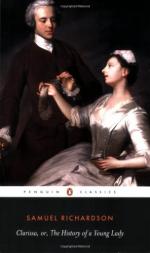Her mother both loves and fears her. Yet is Mrs. Howe also a woman of vivacity, and ready enough, I dare say, to cry out when she is pained. But, alas! she has, as I hinted above, weakened her authority by the narrowness of her mind.
Yet once she praised her daughter to me with so much warmth for the generosity of her spirit, that had I not known the old lady’s character, I should have thought her generous herself. And yet I have always observed, that people of narrow tempers are ready to praise generous ones:—and thus have I accounted for it—that such persons generally find it to their purpose, that all the world should be open-minded but themselves.
The old lady applied herself to me, to urge to the young one the contents of the will, in order to hasten her to fix a day for her marriage; but desired that I would not let Miss Howe know that she did.
I took the liberty upon it to tell Miss Howe that I hoped that her part of a will, so soon, and so punctually, in almost all its other articles, fulfilled, would not be the only one that would be slighted.
Her answer was, she would consider of it: and made me a courtesy with such an air, as showed me that she thought me more out of my sphere, than I could allow her to think me, had I been permitted to argue the point with her.
I found Miss Howe and her own servant-maid in deep mourning. This, it seems, had occasioned a great debate at first between her mother and her. Her mother had the words of the will on her side; and Mr. Hickman’s interest in her view; her daughter having said that she would wear it for six months at least. But the young lady carried her point—’Strange,’ said she, ’if I, who shall mourn the heavy, the irreparable loss to the last hour of my life, should not show my concern to the world for a few months!’
Mr. Hickman, for his part, was so far from uttering an opposing word on this occasion, that, on the very day that Miss Howe put on her’s, he waited on her in a new suit of mourning, as for a near relation. His servants and equipage made the same respectful appearance.
Whether the mother was consulted by him in it, I cannot say; but the daughter knew nothing of it, till she saw him in it; she looked at him with surprise, and asked him for whom he mourned?
The dear, and ever-dear Miss Harlowe, he said.
She was at a loss, it seems. At last—All the world ought to mourn for my Clarissa, said she; But whom, man, [that was her whimsical address to him,] thinkest thou to oblige by this appearance?
It is more than appearance, Madam. I love not my own sister, worthy as she is, better than I loved Miss Clarissa Harlowe. I oblige myself by it. And if I disoblige not you, that is all I wish.
She surveyed him, I am told, from head to foot. She knew not, at first, whether to be angry or pleased.—At length, ‘I thought at first,’ said she, ’that you might have a bolder and freer motive—but (as my Mamma says) you may be a well-meaning man, though generally a little wrong-headed—however, as the world is censorious, and may think us nearer of kin than I would have it supposed, I must take care that I am not seen abroad in your company.’




